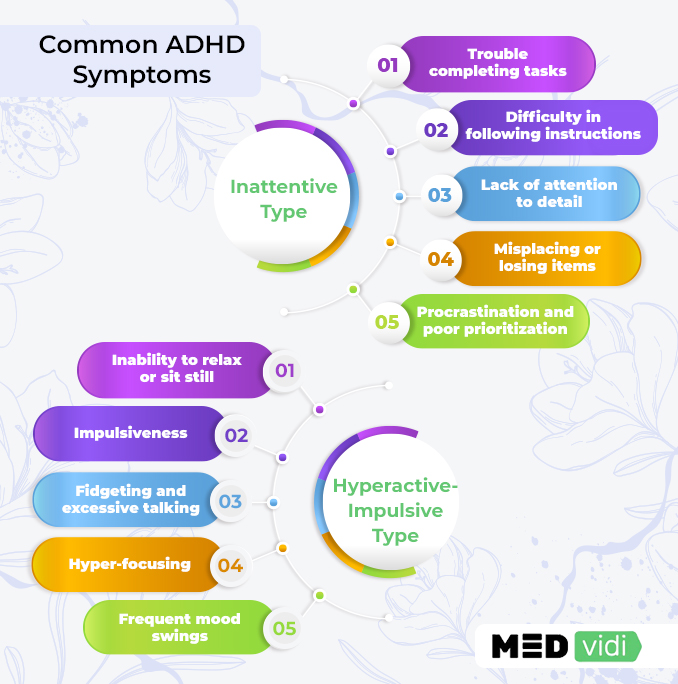The biggest misconception about Attention-Deficit/Hyperactivity Disorder is that this condition is limited to children. Yet, up to
Notable ADHD symptoms determine three categories of the disorder: predominantly inattentive, predominantly hyperactive-impulsive, and combined type. Whichever category, this condition can cause serious relationship, work, and health issues. And either way, treatment starts with the correct diagnosis for ADHD. So, if you experience symptoms similar to those of this condition, it is vital to seek professional help and get assessed. Read on to know more about how this process is built.
See a certified mental health expert to get a legitimate ADHD diagnosis and rule out other conditions.
Common Symptoms of ADHD
Predominantly Inattentive ADHD
This ADHD type was previously referred to as ADD (Attention Deficit Disorder) before it got its current official name. Most people with predominantly inattentive ADHD have trouble with concentration and accomplishing tasks. Symptoms include lack of attention to detail, difficulty in following instructions, inability to remain attentive for extended durations, and inability to complete tasks that require sustained mental effort. Other symptoms may also include misplacing or losing items and being extremely forgetful.
Predominantly Hyperactive-Impulsive ADHD
This type of ADHD is synonymous with the inability to relax or sit still. Those with this condition have trouble listening to instructions and are very impulsive. It is synonymous with endless fidgeting of feet or hands, squirming in a chair, yelling, excessive talking, extreme restlessness, interrupting others, and inability to take turns or wait.
Combined ADHD
This type often comes with a combination of the other presentations discussed above. This type is prevalent in adults and requires more detailed evaluation to get diagnosed. In this case, symptoms of each type (inattentive and hyperactive-impulsive) should be noticed for a certain period of time and have an impact on one’s daily life.
Check your disturbing symptoms for free using our SmartCare screening program.
How to Test for ADHD in Adults
Since there is no single method for testing for ADHD in adults, a qualified doctor will use an array of diagnostic evaluations, assessments, and tests to diagnose ADHD accurately. Below, you’ll find a step-by-step guide on how to get your symptoms checked.
Find the Right Medical Professional
The process of diagnosing ADHD in adults begins with finding the right doctor. Whether you intend to take ADHD testing for adults online or want to visit a clinic, the most important step is to opt for the right professional.
Consider choosing a practitioner with experience and specialty in dealing with ADHD adults. While some general practitioners can also diagnose ADHD, it is best to refer to any of the following specialists:
- Clinical psychologist
- Neurologist
- Psychiatrist
- Clinical social worker
- Primary care physician

Share Your Personal Health History
Prepare to answer as many questions as possible about your behavior as a child or young adult. ADHD always begins earlier in life, often by
Some of the questions during screening could include:
- Were you often in trouble at school or home?
- Were there any notable changes in your performance at school?
- Was your room always organized or in a mess?
- Did you have issues organizing your life as a child?
Carrying medical reports or any relevant documents for review could play a significant role in ADHD testing for adults. Sometimes, a doctor may consider talking to the patient’s parents or older siblings to know more about the symptoms and health history.
At MEDvidi, you can get an ADHD prescription online after a consultation with a mental health professional.
Assess Your Current Life Routines and Difficulties
Your doctor will continue by asking you questions concerning behavioral troubles you encounter in adulthood. These often include any concerns at work or school, relationship troubles, difficulties in paying bills, missing appointments frequently, organization issues, and your driving record.
An ADHD assessment is held on a one-on-one basis. Although some people may feel embarrassed, the outcome of ADHD testing in adults and whether you get a correct diagnosis depends on your answers, so you should be as honest as possible throughout the evaluation process.
Go Through Mental Health Tests
An array of questionnaires are also involved in an ADHD test for adults—you may be asked to fill out some of them before or during your appointment. They include:
- Behavior rating scale. The
behavior rating scales [4*] involve completing a checklist to help highlight symptoms related to psychology, neurology, and neuropsychology. - Testing for mental health conditions. An array of other medical conditions border ADHD and, therefore, the symptoms are sometimes confusable. For example,
cognitive testing [5*] can be beneficial in diagnosing intellectual and learning disabilities. Your doctor may also need to test you for stress, anxiety, or depression.
Start with a Free ADHD Test for Adults with Our Smartcare Symptoms Checker
At MEDvidi, you can complete free ADHD testing via the SmartCare symptoms checker. It is pretty easy to use and will provide you with accurate results. This service is available upon signing up on our platform.
Once completed this brief questionnaire, you can book an appointment to consult with a certified mental health professional and get a personalized treatment plan. It may include psychotherapy, medications, recommendations on lifestyle changes, and tips on improving your awareness, self-direction, and concentration.
Contact us for more information about psychological testing for ADHD in adults and get diagnosed by a professional at MEDvidi.













